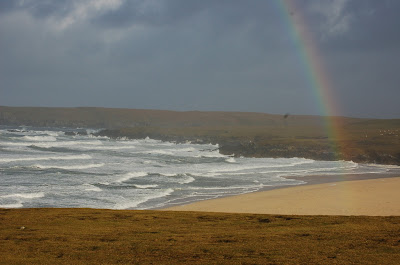Weather update: 6 degrees Celsius (about 43 degrees Fahrenheit); heavy showers and 50mph winds.
Yes, that was necessary.....why d'ya ask?!
This morning began with a site meeting.
All busy days must begin with a meeting.
Brother-in-law arrived with his tractor and spinner - a potato digger - to lift the potatoes, but the result of the meeting was that the ground was too wet to use the tractor.
The potatoes will have to be lifted by hand.
But before that's done, some sheep have to be sorted. A fank was called for.
The boys walk in to the machair. That Big Brother has no consideration - he went off in the pick-up, and left my guys to walk.
I followed on. Imagine....me walking in this weather.
Okay, I was in the car. I had a camera to protect from the elements. Otherwise, I may have been walking.... Or maybe not.
These guys (and dolls) - no specifics here - are on the machair. Tell me: aren't they adorable.
This little guy/doll makes me want to have more kids of my own.
Or maybe he makes me think of rib-eye steaks.
Either way, he makes me drool.
The weather looks almost reasonable here, doesn't it.
Who says the camera never lies?
Another site meeting is called for.
The sea is rough...
The Butt almost looks like it's going under.
They're going to gather the sheep over to the right of this photo and take them into the fank, which is to the fore in the photo.
And here are the sheep in the fank. There are sheep here belonging to four men in the village, including Big Brother.
Then it rained - again.
It was lashing down.
Notice the only one who stayed with the Big Brother.
My wee guy! My little pet, out there in the pouring rain, in the freezing temperatures, and the Force 6 gale. My wee boy!
Okay, so it wasn't exactly freezing, but it wasn't far off.
Then the sun came out and I ventured out of the car.
I know, I'm so brave.
Here are some of big Brother's sheep, forming an orderly queue to .... to.... wait, I'll have to ask.
What are these sheep forming an orderly queue for?
I'll ask Big Brother when he comes in later.
Me: What were you doing with the sheep in the fank today?
Big Brother: I was dozing them, and drenching them.
I'll ask Big Brother when he comes in later.
Me: What were you doing with the sheep in the fank today?
Big Brother: I was dozing them, and drenching them.
Pause: Drenching? Does the rain not do that?
Obligatory roll of eyes. Will I ever learn?
And the dozing?
Big Brother: Dozing them to prevent fluke infestation.
Eeeeewww. Wish I hadn't asked
Big Brother: They were also getting vitamins and trace elements.
Seriously??
BB: Yep.
Aaaahh. Mr Wayne is coming their way next week. They want to be in tip-top condition. I understand.
Big Brother: It makes them more fertile.
Pffft. One look at Mr Wayne at they'll be as fertile as can be.
Then this came out.
If I'd had a wide-angled lens, I could have caught the whole bow in one photo.
I think I'll write a letter: Dear Santa, I've been a good girl.....
You'll also have to excuse the dirty mark on my lens.
Anyway, here's the result of the boys' hard work today
While the earth remaineth, seedtime and harvest, and cold and heat, and summer and winter, and day an night shall not cease. Gen 8:22
P.S. Big Brother has just viewed this post and exclaimed at the photo of the 'orderly queue': NONE of my sheep are in that photo. C'mon woman, surely you know by now! Your readers 'll be thinking I have these sheep. Make sure you tell them.
I now have. Just for the record. None of the sheep in that photo were his. Obviously.













































